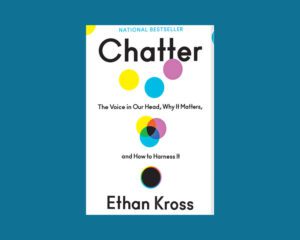When frustrated with an immovable bureaucrat or customer service rep, some people may cuss, pray, punch the wall; or suck it up and swallow it down; or accept their situation. I usually cried. But before the tears, as I would try to explain and reframe my problem repeatedly, a cruel and counterproductive voice would begin inside my head, pointing out my stupidity and the horrific wreckage of my future if I couldn’t make myself clear.
The last time it happened, though, when I felt my throat tightening and tears ready to launch, I paused and said to myself, “Anita, you’ve been here before. You’ll get through this, and the problem will eventually be solved.”
The unhelpful messages in my mind and impending tears stopped. And the problem was eventually resolved.
—
I had help in my struggles with inner silent conversations: I’d been reading Ethan Kross’s book Chatter: The Voice in Our Head, Why It Matters, and How to Harness It.
Kross, a U-M experimental psychologist and neuroscientist, writes in his book that we all have a voice in our head that disconnects us from what is going on around us and produces a conversation in our mind. “Evolution selects qualities that provide a survival advantage,” he writes. “According to this rule, you wouldn’t expect humans to have become such prolific self-talkers if doing so didn’t add to our ‘fitness’ for survival. But the inner voice’s influence is often so subtle and fundamental that we’re rarely if ever aware of all it does for us.”
The positive self-talk voice (“You can do this! Well done!”) quells anxiety and makes way for solutions. The flipside is the self-critic (“Nobody likes you; You’re such a loser”) that reinforces negative messages as relentlessly as a vinyl record stuck in a groove. These persistent negative messages are what Kross calls chatter.
 “Sometimes it’s a compulsive rehashing of past events (rumination); sometimes it’s an angst-ridden imagining of future events (worry). Sometimes it’s free-associative pinballing between negative feelings and ideas,” he writes. In every form, it can “harm our bodies, damage our social lives, and derail our careers.”
“Sometimes it’s a compulsive rehashing of past events (rumination); sometimes it’s an angst-ridden imagining of future events (worry). Sometimes it’s free-associative pinballing between negative feelings and ideas,” he writes. In every form, it can “harm our bodies, damage our social lives, and derail our careers.”
Chatter has received accolades in the Washington Post, CNN, and USA Today. Kross has been interviewed on NPR’s Morning Edition and ABC’s Good Morning America, and the New York Times, the New Yorker, and the New England Journal of Medicine have featured his research.
I emailed to ask what he thought explained the acclaim. One reason, he replied, is the common experience of contending with messages from our own minds: “People are curious to learn more about why it happens and what they can do about it when it does.”
—
One key to our chatter jails, Kross writes in the book, is “distanced self-talk”: addressing ourself by name or second person “you.” Narratives illustrate that and other tools “to resolve the tension between negative thought spirals and thinking clearly and constructively.” A chapter with condensed tool descriptions and instructions includes imagining giving advice to a friend in the same situation, reframing your experience as a challenge, creating order in spaces around you, journaling, looking at a loved one’s photograph, and getting out into nature. The helpful experiences of awe and soothing rituals are there, too.
I ask if the isolation of the pandemic and ongoing political and racial discord have increased the self-critical voice.
“I think the pandemic is the chatter event of the last 100 years,” Kross replies. “We know that the pandemic has been a period of tremendous uncertainty and lack of control, and these are two agents that fuel chatter. And we have seen rises in states of anxiety and stress due to the pandemic. I suspect that the situation in Ukraine is having a similar impact on some people.”
Kross isn’t immune to chatter. In the book, he describes the time he appeared on the CBS Evening News—and the next day, found a menacing letter from a viewer in his office mailbox.
Despite his career in the study of the inner voice and law enforcement’s assurances that he and his family were unlikely to be harmed, he became hypervigilant. Unable to sleep, he stood in the dark holding a Little League baseball bat, waiting to fend off the nefarious madman.
When he found himself searching online for bodyguards for professors, he stopped and said to himself, “Ethan, what are you doing? This is crazy! … How is pacing the house with a baseball bat going to help? You have a state-of-the-art alarm system.”
More rational thoughts followed. Then he told himself, “Ethan, go to bed.”
He did, and he slept soundly.